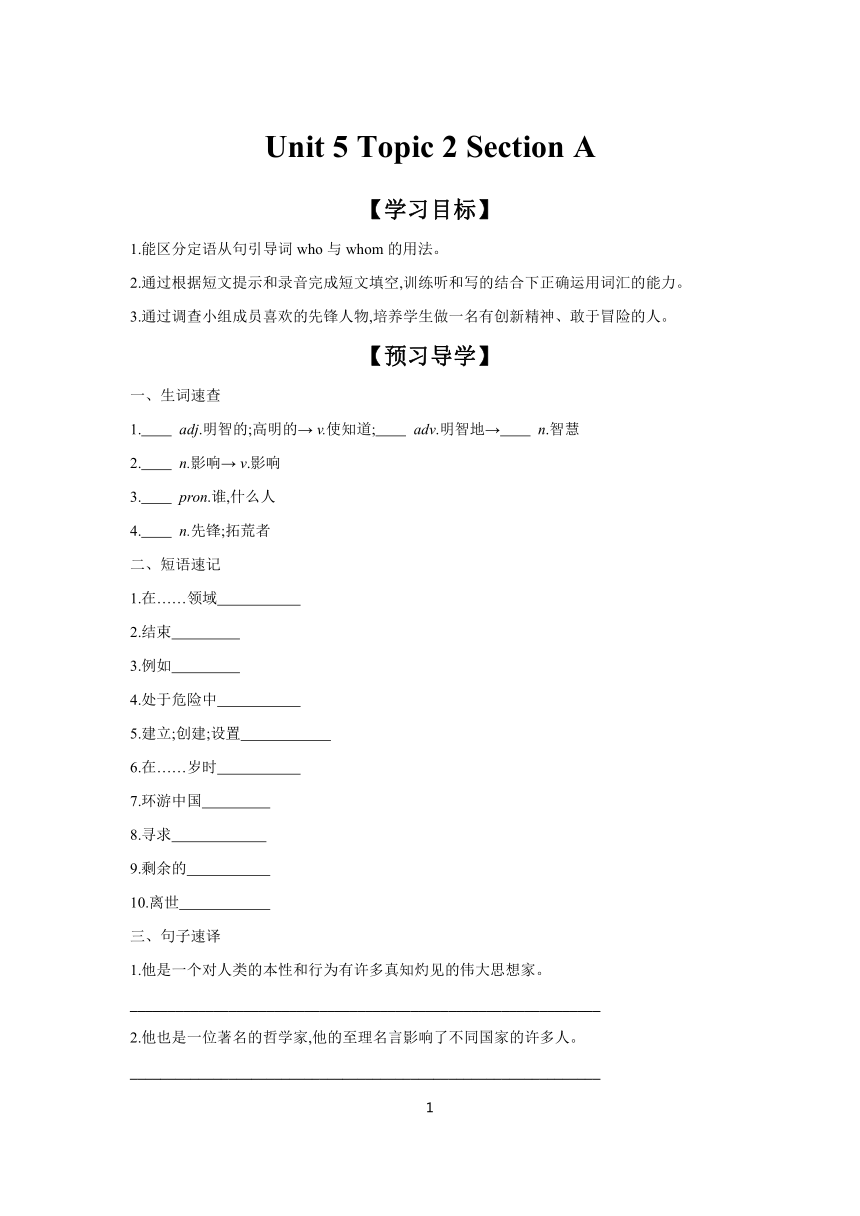Unit 5 China and the world Topic 2 Section A 学案 初中英语仁爱版九年级下册
文档属性
| 名称 | Unit 5 China and the world Topic 2 Section A 学案 初中英语仁爱版九年级下册 |

|
|
| 格式 | docx | ||
| 文件大小 | 22.6KB | ||
| 资源类型 | 教案 | ||
| 版本资源 | 仁爱科普版 | ||
| 科目 | 英语 | ||
| 更新时间 | 2024-02-21 00:00:00 | ||
图片预览


文档简介
Unit 5 Topic 2 Section A
【学习目标】
1.能区分定语从句引导词who与whom的用法。
2.通过根据短文提示和录音完成短文填空,训练听和写的结合下正确运用词汇的能力。
3.通过调查小组成员喜欢的先锋人物,培养学生做一名有创新精神、敢于冒险的人。
【预习导学】
一、生词速查
1. adj.明智的;高明的→ v.使知道; adv.明智地→ n.智慧
2. n.影响→ v.影响
3. pron.谁,什么人
4. n.先锋;拓荒者
二、短语速记
1.在……领域
2.结束
3.例如
4.处于危险中
5.建立;创建;设置
6.在……岁时
7.环游中国
8.寻求
9.剩余的
10.离世
三、句子速译
1.他是一个对人类的本性和行为有许多真知灼见的伟大思想家。
______________________________________________________________
2.他也是一位著名的哲学家,他的至理名言影响了不同国家的许多人。
______________________________________________________________
3.学而不思则罔,思而不学则殆。
______________________________________________________________
4.He was really a great man from whom I can learn a lot.
______________________________________________________________
◎学法指导:通过观察上面的4个句子,你能发现这些句子都是什么类型的复合句吗 请标注出来。
四、想一想
预习课本1a,回答下列问题。
1.What field is Confucius a pioneer in
______________________________________________________________
2.What does “He who learns but does not think is lost; he who thinks but does not learn is in danger.” tell us
______________________________________________________________
3.What man was really Confucius
______________________________________________________________
◎学法指导: 你还能提出什么问题吗 试着自己根据课本1a再提几个问题让小组成员回答。
【答案】
一、
1.wise wisely wisdom
2.influence
3.whom
4.pioneer
二、
1.in the field of
2.come to an end
3.for example/such as
4.in danger
5.set up
6.at the age of
7.travel around China
8.search for
9.the rest of
10.pass away
三、
1.He was a great thinker who had many wise ideas about human nature and behavior.
2.He was also a famous philosopher whose wise sayings have influenced many people in different countries.
3.He who learns but does not think is lost; he who thinks but does not learn is in danger.
4.他确实是一个了不起的人,从他身上我能学到很多东西。
四、
1.Confucius is a pioneer in the field of education.
2.It tells us the importance of learning and thinking.
3.Confucius was really a great man from whom we can learn a lot.
【合作探究】
任务驱动一 语法探究
根据句意及句式在横线上填入who或whom
1.Is he the man wants to see you
2.She is the woman I saw last night.
3.He asked me with I had discussed the problem.
◎学法指导:who和whom都意为“谁”。当引导定语从句时,who和whom是引导词,不翻译。who在从句中作主语或宾语;whom在从句中作宾语;在从句中作介词的宾语时,只能用whom。
任务驱动二 听力训练
1.听录音,独立完成1b练习,组内核对答案后朗读听力材料、重要的短语和句子。
2.听录音,跟录音朗读课文,注意语音语调,独立完成课本2的内容,然后两人一组把练习2改编成一篇短文,把孔夫子的故事讲给大家听。
任务驱动三 小组活动
1.合作讨论练习3中的句子,然后诵读这些句子并熟记。
2.听录音,完成4b的练习。小组间进行讲故事比赛,给同班同学讲述孔夫子和秦始皇的故事,然后评选出讲故事的小能手。
【答案】
任务驱动一
1.who
2.who/whom
3.whom
【知识超市】
[命题点]when/while 引导的时间状语从句
●Every teacher should, therefore, follow in Confucius' footsteps when teaching.因此,每个老师教学时应效仿孔子的教学理念。
思考:这里when teaching的另一种说法是 。
【答案】
when/while he/she teaches
◎用法总结:当when和while意为“当……时候”引导时间状语从句时,若主语与主句的主语相同,可将从句中的主语删除并将之后的动词变成现在分词;当有be动词时,一并省略。否则,不可以如此使用。
对点自测
翻译下列句子
1.Don't be afraid of asking for help while it is needed.
______________________________________________________________
2.He was about to tell me the secret when someone patted him on the shoulder.
______________________________________________________________
3.Experience is not what you have done, it is what you have learned while doing it!
______________________________________________________________
4.你开车时应该小心谨慎。
______________________________________________________________
5.当讨论还在进行时,老师进来了。
______________________________________________________________
【答案】
1.当需要时,不要害怕寻求帮助。
2.当有人拍他肩膀时,他正准备告诉我那个秘密。
3.经验不是你曾经做过什么,而是你在做的过程中学到了什么!
4.When/while driving, you should be careful.
5.While the discussion was still going on, the teacher came in.
2
【学习目标】
1.能区分定语从句引导词who与whom的用法。
2.通过根据短文提示和录音完成短文填空,训练听和写的结合下正确运用词汇的能力。
3.通过调查小组成员喜欢的先锋人物,培养学生做一名有创新精神、敢于冒险的人。
【预习导学】
一、生词速查
1. adj.明智的;高明的→ v.使知道; adv.明智地→ n.智慧
2. n.影响→ v.影响
3. pron.谁,什么人
4. n.先锋;拓荒者
二、短语速记
1.在……领域
2.结束
3.例如
4.处于危险中
5.建立;创建;设置
6.在……岁时
7.环游中国
8.寻求
9.剩余的
10.离世
三、句子速译
1.他是一个对人类的本性和行为有许多真知灼见的伟大思想家。
______________________________________________________________
2.他也是一位著名的哲学家,他的至理名言影响了不同国家的许多人。
______________________________________________________________
3.学而不思则罔,思而不学则殆。
______________________________________________________________
4.He was really a great man from whom I can learn a lot.
______________________________________________________________
◎学法指导:通过观察上面的4个句子,你能发现这些句子都是什么类型的复合句吗 请标注出来。
四、想一想
预习课本1a,回答下列问题。
1.What field is Confucius a pioneer in
______________________________________________________________
2.What does “He who learns but does not think is lost; he who thinks but does not learn is in danger.” tell us
______________________________________________________________
3.What man was really Confucius
______________________________________________________________
◎学法指导: 你还能提出什么问题吗 试着自己根据课本1a再提几个问题让小组成员回答。
【答案】
一、
1.wise wisely wisdom
2.influence
3.whom
4.pioneer
二、
1.in the field of
2.come to an end
3.for example/such as
4.in danger
5.set up
6.at the age of
7.travel around China
8.search for
9.the rest of
10.pass away
三、
1.He was a great thinker who had many wise ideas about human nature and behavior.
2.He was also a famous philosopher whose wise sayings have influenced many people in different countries.
3.He who learns but does not think is lost; he who thinks but does not learn is in danger.
4.他确实是一个了不起的人,从他身上我能学到很多东西。
四、
1.Confucius is a pioneer in the field of education.
2.It tells us the importance of learning and thinking.
3.Confucius was really a great man from whom we can learn a lot.
【合作探究】
任务驱动一 语法探究
根据句意及句式在横线上填入who或whom
1.Is he the man wants to see you
2.She is the woman I saw last night.
3.He asked me with I had discussed the problem.
◎学法指导:who和whom都意为“谁”。当引导定语从句时,who和whom是引导词,不翻译。who在从句中作主语或宾语;whom在从句中作宾语;在从句中作介词的宾语时,只能用whom。
任务驱动二 听力训练
1.听录音,独立完成1b练习,组内核对答案后朗读听力材料、重要的短语和句子。
2.听录音,跟录音朗读课文,注意语音语调,独立完成课本2的内容,然后两人一组把练习2改编成一篇短文,把孔夫子的故事讲给大家听。
任务驱动三 小组活动
1.合作讨论练习3中的句子,然后诵读这些句子并熟记。
2.听录音,完成4b的练习。小组间进行讲故事比赛,给同班同学讲述孔夫子和秦始皇的故事,然后评选出讲故事的小能手。
【答案】
任务驱动一
1.who
2.who/whom
3.whom
【知识超市】
[命题点]when/while 引导的时间状语从句
●Every teacher should, therefore, follow in Confucius' footsteps when teaching.因此,每个老师教学时应效仿孔子的教学理念。
思考:这里when teaching的另一种说法是 。
【答案】
when/while he/she teaches
◎用法总结:当when和while意为“当……时候”引导时间状语从句时,若主语与主句的主语相同,可将从句中的主语删除并将之后的动词变成现在分词;当有be动词时,一并省略。否则,不可以如此使用。
对点自测
翻译下列句子
1.Don't be afraid of asking for help while it is needed.
______________________________________________________________
2.He was about to tell me the secret when someone patted him on the shoulder.
______________________________________________________________
3.Experience is not what you have done, it is what you have learned while doing it!
______________________________________________________________
4.你开车时应该小心谨慎。
______________________________________________________________
5.当讨论还在进行时,老师进来了。
______________________________________________________________
【答案】
1.当需要时,不要害怕寻求帮助。
2.当有人拍他肩膀时,他正准备告诉我那个秘密。
3.经验不是你曾经做过什么,而是你在做的过程中学到了什么!
4.When/while driving, you should be careful.
5.While the discussion was still going on, the teacher came in.
2
同课章节目录
- Unit 5 China and the world
- Topic 1 China attracts millions of tourists from a
- Topic 2 He is really the pride of China.
- Topic 3 Now it is a symbol of England.
- Unit 6 Entertainment and Friendship.
- Topic 1 I would rather watch sports shows than tho
- Topic 2 Who is your favorite character in literatu
- Topic 3 I will remember our friendship forever.
